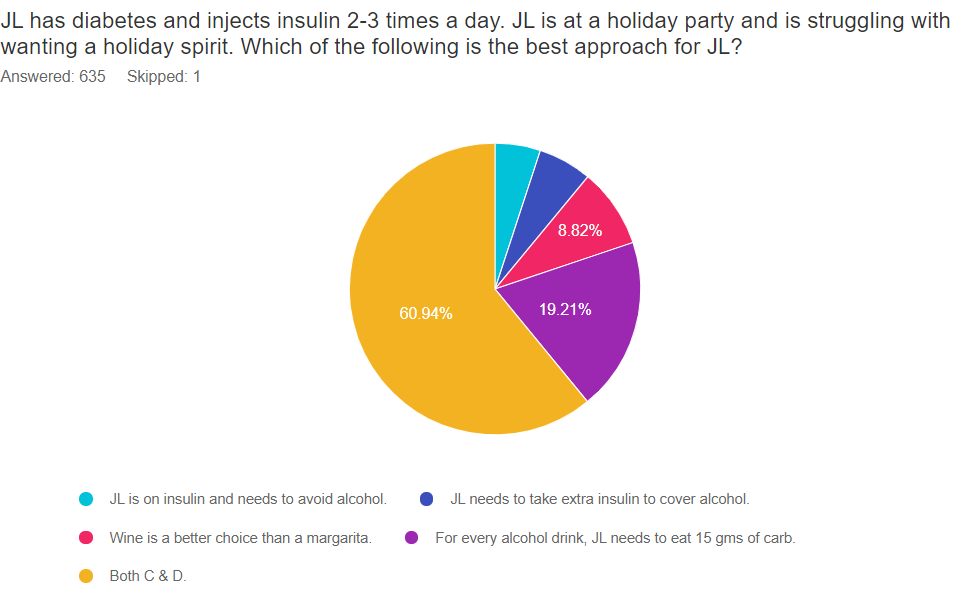
Given that people with diabetes might have a drink or two during the season, we thought that this was an important topic to discuss further. Our December 1st Question of the week was a question of alcohol consumption during the holidays. Over 60% of respondents, chose the best answer.
Before we start though, if you don’t want any spoilers and haven’t tried the question yet, you can answer below: Answer Question
Question: JL has diabetes and injects insulin 2-3 times a day. JL is at a holiday party and is struggling with wanting a holiday spirit. Which of the following is the best approach for JL?
Answer Choices:
- A. JL is on insulin and needs to avoid alcohol.
- B. JL needs to take extra insulin to cover alcohol.
- C. Wine is a better choice than a margarita.
- D. For every alcohol drink, JL needs to eat 15 gms of carb.
- E. Both C & D.

As shown above, the most common choice was option 5, the second most common answer was option 4, then option 3, then option 2, and finally option 1.
Getting to the Best Answer
If you are thinking about taking the certification exam, the content of this practice test question will set you up for success. The exam questions won’t have 2 right answers, but alcohol and diabetes is expected content on the exam.
Answer 1 is incorrect. 5.04% chose this answer. “JL is on insulin and needs to avoid alcohol.” Based on the American Diabetes Association standards of care, people with diabetes on insulin can include alcohol as part of their meal plan.
The current recommendations are; women with diabetes limit their alcohol consumption to one drink a day or less and men with diabetes limit consumption to two or fewer drinks a day.
There are side effects to consider. Alcohol can worsen triglyceride levels, intensify neuropathic pain, and lead to unwanted weight gain. Plus, it can increase the risk of hypoglycemia. So, the decision to consume spirits is a person-centered decision, based on individual needs and health status.

One serving of alcohol =
- 5 ounces of wine
- 1.5 ounces of hard liquor
- 12-ounce beer
Answer 2 is incorrect. 5.98% of you chose this answer. “JL needs to take extra insulin to cover alcohol.” Alcohol can cause hypoglycemia for hours after consumption. Alcohol metabolism in the liver delays the release of glycogen stores and can lead to low circulating glucose levels. Some people with type 1 diabetes may even need to adjust their insulin dose at a meal if consuming alcohol.
People with type 1 diabetes need to be extra cautious if their before bed glucose is elevated after consuming alcohol. Before giving extra insulin to treat nighttime high glucose, remind them that glucose levels will trend down overnight with alcohol on board, and they probably don’t need that extra bolus of insulin.
Answer 3 is correct, but so is answer 4. “Wine is a better choice than a margarita.” Wine is a better choice since it does not have all the extra sugar and carbohydrates of a margarita. Wine consumption has a more predictable outcome whereas figuring out how much carbohydrate is in a margarita can be tricky. Mixed sugary drinks may cause blood glucose levels to rise initially than drop, later on, making management more difficult.
Answer 4 is correct, but so is answer 3. “For every alcohol drink, JL needs to eat 15 gms of carb.” Since we know that alcohol can lead to hypoglycemia for those who are on insulin therapy or take a sulfonylurea, coupling each of their favorite adult beverages with 15 gms of carb can prevent unwanted hypoglycemia.
Another issue is that the signs of hypoglycemia can mirror the signs of intoxication. Encourage people to keep a close eye on their CGM or meter results when imbibing. And include their friends in on helping to detect and treat hypoglycemia to keep safe during celebrations.
Answer 5 is correct. 60.94% chose this answer. “Both C & D.”
We hope you appreciate this week’s rationale! Thank you so much for taking the time to answer our Question of the Week and participate in this fun learning activity!
Want more exam practice questions? Enroll in our Test Taking Toolkit with 220+ Practice Questions!
“This is one of the best review courses I’ve ever taken.”
“I learned so much from the CDCES Exam Prep Toolkit. I now have an assessment after taking the practice exam on the areas I need to focus my studying.”
Student Feedback

Whether you are preparing for the CDCES or BC-ADM exam, this test-taking toolkit is designed to prepare you for success. This toolkit includes two courses with over 200 practice questions to help you prepare and simulate the exam. Plus, we have added a FREE bonus course, Language, and Diabetes – What we say matters. Coach Beverly added this course because she believes it contains critical content for the exam and for our clinical practice!
Sign up for Diabetes Blog Bytes – we post one daily Blog Byte from Monday to Friday. And of course, Tuesday is our Question of the Week. It’s Informative and FREE! Sign up below!
[yikes-mailchimp form=”1″]Accreditation: Diabetes Education Services is an approved provider by the California Board of Registered Nursing, Provider 12640, and Commission on Dietetic Registration (CDR), Provider DI002. Since these programs are approved by the CDR it satisfies the CE requirements for the CDCES regardless of your profession.*
The use of DES products does not guarantee the successful passage of the CDCES exam. CBDCE does not endorse any preparatory or review materials for the CDCES exam, except for those published by CBDCE.








